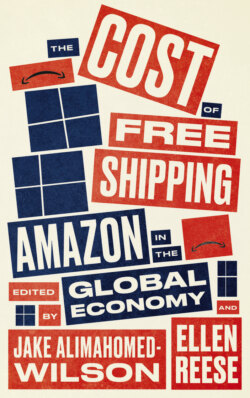Читать книгу The Cost of Free Shipping - Группа авторов - Страница 11
На сайте Литреса книга снята с продажи.
Introduction: Amazon Capitalism Jake Alimahomed-Wilson, Juliann Allison, and Ellen Reese
ОглавлениеAmong the world’s most powerful corporations, Amazon’s recent growth has been unparalleled. Initially founded in 1995 as an electronic book vendor, Amazon became the world’s second “trillion-dollar corporation” (after Apple) in 2018, a feat underscoring its immense size and economic influence.1 The following year, Amazon overtook Google and Apple to become the world’s most valuable corporation on the planet in terms of market value.2 By April 2020, the corporation’s market cap increased even further, to $1.14 trillion as demand for its services surged amid the global COVID-19 pandemic.3 That same month, as COVID-19 cases were spreading across its global workforce and the first U.S. warehouse worker death from the disease was reported, the personal wealth of the company’s Chief Executive Officer, Jeff Bezos, the richest person in world history, climbed to $138 billion.4 Amazon would emerge from the global pandemic even stronger. The meteoric rise of this corporation represents a significant shift in the global political economy, that we identify as Amazon capitalism. By naming this phenomenon, we seek to draw attention to the concentration of corporate power manifest in the scale and magnitude of Amazon’s influence in the world’s economy and to highlight the true costs of its “free shipping” for workers, communities, and the environment.
Amazon’s rise illuminates a pivotal moment in global capitalism that demands naming, interrogating, and resisting. Amazon, the corporation, is not simply a “bad apple,” nor is its peculiar business and labor practices the product of the individual greed and maniacal impulses of its founder, Jeff Bezos, and other top executives. All corporations share one fundamental objective: to maximize profit. Indeed, the problems associated with Amazon capitalism are systemic within our global capitalist system, which is embedded and interacts with other social and political relations of domination that operate at multiple scales, from the local to the global. Amazon’s rise in power reflects, and makes visible, the larger global trend of the increasing influence of finance capitalism, neoliberal politics and policies, and corporate power. Indeed, the world’s leading transnational corporations today continue to accrue revenues far ahead of most nation states. Of the world’s top 200 economic entities, 157 are corporations and 43 are governments.5 Even back in 2019, Amazon’s market capitalization was slightly more than the combined GDP of nine Latin American countries combined.6
Together, the chapters in this volume provide empirically grounded and critical case studies of the dynamic and multiscalar development of the Amazon corporation, and the emerging networks of community and labor activists that are resisting its practices. Our contributors thus deepen our understanding of what Jamie Peck and Nik Theodor call the “variegated” nature of capitalism; variegated capitalism takes plural forms over time and across multiple spaces, places, and geographic scales.7 Extending these insights, we argue that there are distinct types of capitalism that are emblematic of, and promoted by, the world’s largest transnational corporations, such as Amazon, that are of enormous significance and worthy of investigation; their scope and influence are multifaceted, dynamic, and extend far beyond the workplace, leaving their footprints on our communities, politics, and environment. Just as the operations of Amazon, and other large transnational corporations, occur at multiple scales and sites—transnational, regional, national, and local—so do our investigations cover multiple scales, from global and regional patterns to differences across local and national contexts.
This introductory chapter provides an overview of some of the key features of Amazon capitalism. First, we review the significance of Amazon in terms of its rising but uneven influence globally and its role in promoting both one-click consumerism and surveillance capitalism.8 After describing the increasingly diverse nature of goods and services Amazon produces and sells, we discuss its rising monopoly power and exploitation of third-party sellers. We then examine how the rise of Amazon has reshaped logistics and retail, and negatively affected workers, communities, and the environment.
